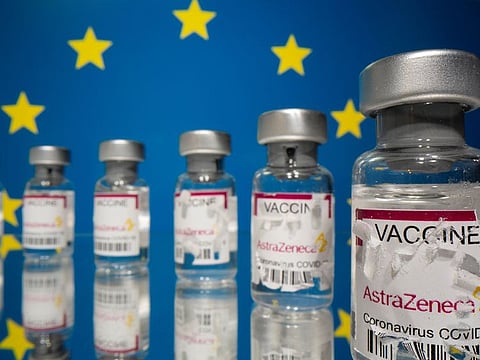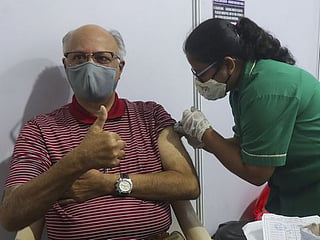Vaccine populism is how Europe loses
At the height of the pandemic the world is watching Europe with dismay

Europe’s vaccination campaign is a mess, failing to outpace a fresh wave of covid-19 infections that’s straining hospitals and triggering more stay-at-home curbs. The European Union’s tally of average doses administered per 100 people stands at 11.8, well behind the US and the UK at 34.1 and 40.5 respectively (though there is some divergence between the EU’s 27 members).
Even with four vaccines approved by EU regulators, governments are fumbling the logistics of getting needles in arms. Efforts to hold drugmakers’ feet to the fire over supply shortfalls, while understandable, are turning bad-tempered, with threats to seize doses destined for export if necessary.
This is all the more surreal given several EU countries suspended use of the AstraZeneca shot this week due to blood-clot fears. Vaccines are being fought over, but not actually used.
Politically milder response
On top of that, the bloc’s pandemic recovery fund already has the feeling of being too little too late. While the Biden administration launches a blockbuster $1.9 trillion fiscal spending plan, the EU’s politically fraught and milder response will likely put the euro area a year behind the US in recovering to pre-virus levels. “I’d love to see Europe growing faster,” Federal Reserve Chairman Jerome Powell mused last week.
There is still hope that some of this is temporary or fixable — the vaccine supply outlook is improving and lockdowns have a way of focusing the mind. And the resilient popularity of some incumbent EU leaders gives them latitude to take action rather than worry about the traditional bogeyman of Euro-sceptic populism.
In the Netherlands, Mark Rutte has become the longest serving premier in Dutch history after his centre-right party came in first in election, pushing Eurosceptics to third place. French President Emmanuel Macron, while hardly popular, is still polling higher than he was during the Yellow Vest riots that channelled anger against tax hikes and his aloof style.
Yet the mix of confusion, dithering and finger-pointing reflects a deeper malfunction. It shows the limits of the leadership style that’s dominated EU politics, one that combines a respect for expert-driven technocracy with personalised, crowd-pleasing populism.
Macron’s victory in 2017 was emblematic of this: A young former banker who positioned himself as neither Left nor Right, his promise was more competent government delivered by non-establishment specialist outsiders.
This nonideological approach had broader appeal than anti-EU platforms, not just in France but elsewhere. Rutte described his own 2017 win as a victory over the “wrong kind” of populism.
The result today is a crisis in the decision-making that is both technocratic and populist — or “techno-populist,” as academics Chris Bickerton and Carlo Invernizzi Accetti call it in a new book — which is seemingly at odds with making the tough choices required in a pandemic.
The AstraZeneca suspension and constant indecision in France over national lockdown are examples of how the technocratic search for a “right answer” based on evidence-based analysis can wind up incurring costs through inaction.
Undermine public trust
The constant urge to reconcile different points of view to avoid alienating anyone makes it “very difficult to act,” Bickerton and Accetti write. The fact that Macron, portrayed by his advisers as a self-taught expert on diseases, personalises these decisions by running weekly pandemic-management “defence councils” only serves to antagonise the actual experts and threatens to undermine public trust.
This instinct is seeping into Brussels, too, where the arch-technocratic European Commission, led by Ursula von der Leyen, is discovering its own inner vaccine populist. Threats to ban exports if manufacturers don’t fulfil their obligations are fine in theory, given leaders’ moral and legal imperative to protect EU citizens (and taxpayers).
But given the long global supply chain of vaccines, and the EU’s estimate that it will need at least 18 months to become fully autonomous in this field, all such threats accomplish is augmenting the risk of triggering copycat behaviour around the world — and prolonging the pandemic as a result.
Is there any way out of this? One might be to start setting targets and delivering on them. Why not promise to achieve the same rate of vaccinations as the US, something that should be possible for the world’s biggest single market?
An effective vaccination campaign wouldn’t suddenly settle all outstanding European bust-ups, not least given the almighty rows that are being stored up over spending plans and the potential return of deficit limits. Yet with Macron up for reelection next year, and Merkel’s political swan song fast approaching, it would be an achievement that might at least uphold the promise of the “techno” side of things, if not the “populism.”
If there’s one thing technocratic Europe should be able to do, it’s the straightforward stuff of effective bureaucracy. Otherwise it’s not just pharma executives who risk finding themselves on the hot seat.
Lionel Laurent is a columnist covering the European Union and France. He worked previously at Reuters and Forbes.
Bloomberg








